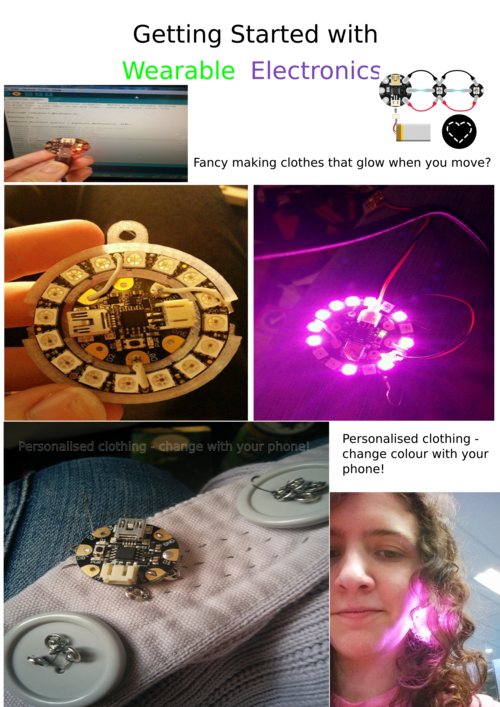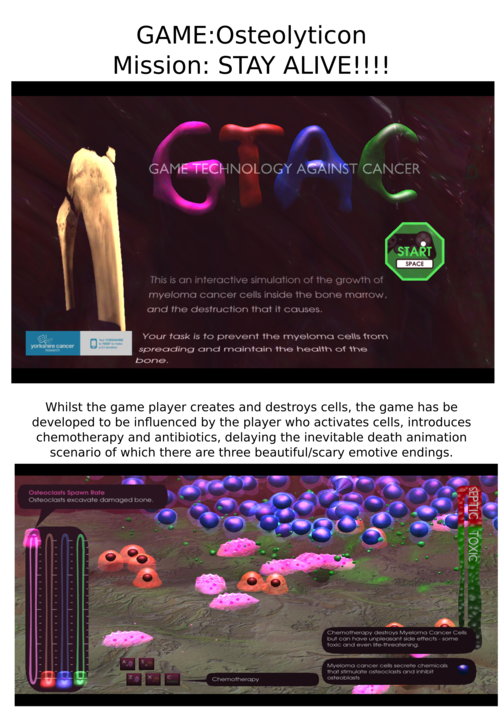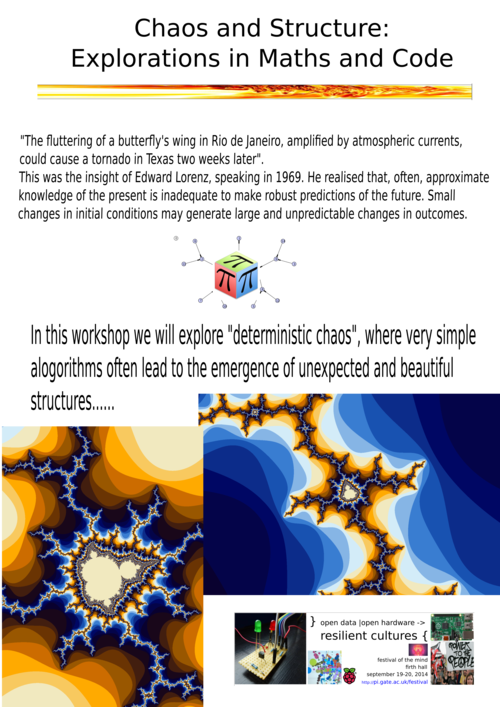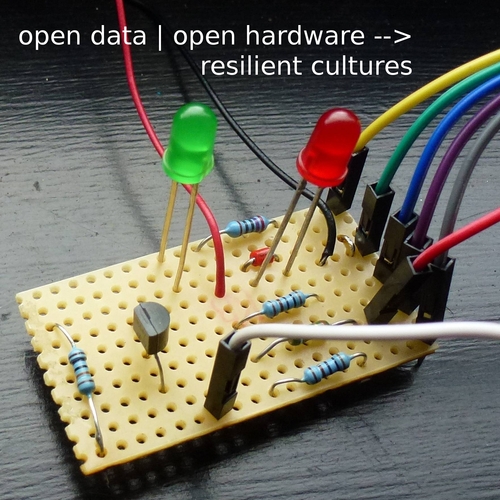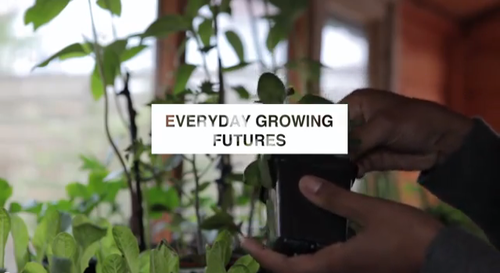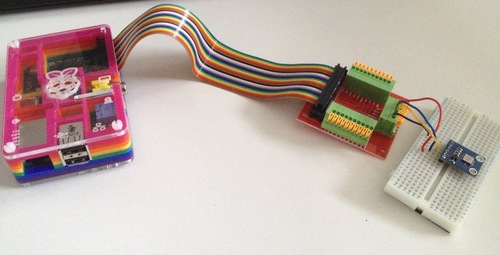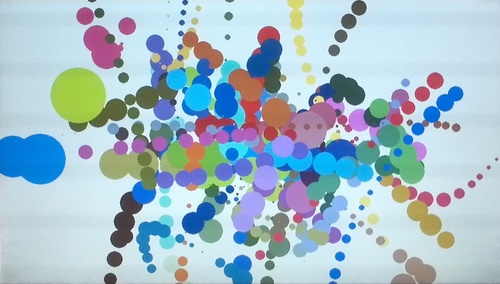} Open Data | Open Hardware -> Resilient Cultures {
Resilience is ability to bounce back from stresses, strains and shocks. Resilient Cultures is about how open source software, open data and open hardware can help build social resilience.
A society is resilient if it can supply its needs (e.g. for food, shelter or health) without relying on systems outside of its control.
Resilient Cultures is a two-day event at the Festival of the Mind 2014 looking to the contribution of open technology to resilience.
Programme
- Friday 19th September 9.30 — 2.30: schools only (Firth Hall)
- Friday 19th 8pm — midnight: Resilient Cultures gig at Audacious Art Space
- Saturday 20th September 10 — 4: open to all (Firth Hall)
The Exhibits:
- Build a Raspberry Pi Weather Station (Jo Bates, Information Studies): have a go at building your own Raspberry Pi weather station and sharing the data that you generate directly with the Met Office's Weather Observations Website.
- Open Wearable Electronics (Charlotte Godley): Learn how to put together a simple, customisable flashing circuit using boards you can put into your clothing! See how this can then be customised to your own colours and style and inspiration of what projects this could be put into.
- Bio-Microscopy (Ashley Cadby, Physics): gain a whole new perspective on microbes and their habits with this exhibit of high-power microscopes operating at variable focal lengths to expose the secret life of bacteria.
- Chaos and Structure, Maths and Code (Sam Dolan, Maths) will explore deterministic chaos where simple algorithms often lead to unexpected and beautiful structures like fractals.
- Sheffield's Raspberry Pi Factory (Gee Bartlett from Pimoroni) will showcase simple robotics and games from Sheffield's own Pi company.
- Everyday Growing Cultures (Farida Vis, Information Studies) explores the potential of digital engagement and open data for allotment holders and those interested in cultivating currently unused plots of council-owned land, in order to build stronger, more active communities, benefit local economies and improve environmental sustainability and food security.
- The PiBrush (Fred Sonnenwald, Hamish Cunningham) is an interactive art and technology exhibit that simulates flicking paint off the end of a paintbrush onto canvas — as Jackson Pollock famously did in the 1940s and 50s. It uses two Raspberry Pis and an accelerometer.
- RoboPlant (Colin Osborne, Plant Biology / Alastair Buckley, Physics) is a human-sized robot mimicking the replicable stages of photosynthesis in plants. Photovoltaic panels absorb light and convert it into electricity. This powers an electrolyser which splits water into hydrogen and oxygen.
- Game Technology Against Cancer (Cassie Limb). Come and play with the cells that keep you standing, explore their environment in an inflatable bone sculpture, connect with the smallest cells that support your every step and play the latest in cancer busting open source games!
- Laser-Cut Geodesics (James Wallbank, Access Space) will showcase geodesic dome and hexayurt models built from laser-cut panels for resilient modular architecture.
- 3D Scanning (John Moseley, Access Space): 3D printers herald new possibilities in micro-manufacturing — but how do we create the designs that they print? This exhibit will showcase 3D scanning, taking 3D objects and turning them into computational models.
- Open Source Music (Mark Hadman): hand-coded digital and hand-soldered analogue sound machines used for live ambient/drone performance by Mark Hadman (aka Spandril).
- Numbers to Grooves (Dominic Moore). Turn yourself into an 8 bit analogue computer via the miracles of tapping, bashing and bumping. Dominic's workshop will build live rhythm machines from its participants. Digital music technology works on encodings — as does musical notation — but here the encoding is you and the computer is the group. This is how music originated — and it was all 100% open source up until a few hundred years ago! Music is almost certainly older than language itself — so we're all music experts! Specialist musicians and musicologists have a specialised nomenclature and notation for representing tunes and rhythms, but Dominic will remind us that the digital is always only an approximation of sound and that we all know how to make music already — and we're the real thing!
- Big Data and Gut Bacteria (Keith Harris, Maths). Big Data is a buzzterm for the collection of data sets so complex that they become extremely difficult to store and analyse using traditional techniques. The belief is that Big Data will allow correlations to be found that will enable us to spot business trends, prevent disease outbreaks, combat crime, etc., but big data may be unrepresentative leading to biased results and the 'discovery' of relationships from chance correlations. Can the graphical visualisation of multidimensional data help?
Open Technology for Resilience
That light in the tunnel? It's a train :-(
Climate chaos is accelerating and our market-driven system has no mechanism to respond. (There's no short-term profit in saving the planet!)
What to do?
Many things, but one of them is to build resilience: our capacity to withstand shocks and changes.
As noted above, a society is resilient if it can supply its needs (e.g. for food, shelter or health) without relying on systems outside of its control.
A society is less likely to be resilient if it relies on shipping large parts of its needs half way around the world. We are vulnerable to disruption brought by war, or the chaotic weather systems brought by climate change, or the volatile price of oil.
How can openness help resilience?
The problem of surveillance is a good example. As shown by Wikileaks and by Edward Snowden and others, powerful states now routinely invade the privacy of their citizens. The lid on the laptop in my bedroom has a camera in it; is someone at NSA or GCHQ peering out of it as I write this? The paranoid fantasy of a few years ago is now documented reality. And a society under surveillance is not resilient because:
- at least several hundred thousand people have access to the data: we are now forced to trust each and every one of them in perpetuity
- we have created a perfect weapon for future dictatorships and despots
- universal surveillance leads to self-censorship and undermines democracy (how long until corrupt politicians use surveillance data to compromise their opponents?)
Open source software is the only possible defence against indiscriminate state surveillance. Closed systems (e.g. Microsoft Windows, Apple iOS, Google's Android services, etc. etc.) allow spy agencies to demand the inclusion of hidden backdoors and then to prevent the system owners from saying anything about their interference on pain of imprisonment1. (Not everything open is safe, of course — witness the recent heartbleed bug — but everything closed is unsafe by definition. Bugs in open systems get found and fixed; bugs and backdoors in closed systems are hidden forever.)
Another example: governments responded to the 2008 banking crisis by donating trillions of tax $s/€s/£s to the banks. A society in which there is no moral hazard (not to mention imperilment of bankers' bonuses) involved in stimulating unsustainable investment bubbles is not resilient — there's no reason not to do it all over again! (In fact looking back at the dotcom boom we might think we're already in repetition territory.)
Open data can help: the more transparency we have in the use of government and corporate funds the more we can understand the implications of policy, deregulation and the like. Open data can also challenge false assumptions about how the economy impacts on health and wellbeing, for example. In The Spirit Level public health epidemiologists use open medical, geographical and income statistics to demonstrate that greater inequality means lower quality of life for all members of society.
Open hardware contributes to resilience by making designs repeatable, adaptable and local. For example, instead of buying furniture made a thousand miles away from trees harvested in the Amazon, we might download a design to a workshop in our locality who would cut it from reclaimed wood. Open hardware allows people to make their own robots and cameras (or even electrocardiograph machines!) in this way. In computing and electronics open hardware is helping build skills and manufacturing locally instead of in Shenzhen or Seoul. The UK's Raspberry Pi, for example (a cheap computer made in Wales which is very easy to integrate with other devices) is one of the drivers behind the new focus on programming with open source in the schools curriculum.
The New Computing Schools Curriculum
Computing took a problematic turn when it became solely about learning office applications. Tools for experimentation and imagination became closed and ICT education suffered as programming dropped out of school syllabuses. With the advent of cheap, easily configurable computing devices (of which the UK's Raspberry Pi is the most prominent example) the boundary between creative culture and information engineering is re-opening.
A new conjunction is emerging around open hardware, maker culture, and art. Parallels exist with the explosive change in pop culture pressaged by punk: the Homebrew Computer Club trading circuits and information; Iain M. Banks' legacy of technofutures, blending electro-augmented humanity with benevolent AI; wearable electronics kits — e.g. by Adafruit, honouring Ada Lovelace, inventor of the computer algorithm.
Resilient Cultures will celebrate these trends, bringing together collaborations between extraordinary performance, science and engineering practitioners with around a dozen exhibits plus a regular stage show. Around half of these are drawn from exhibitors/visitors met at the 2013 Ideas Bazaar, with a balanced set from the academic and artistic populations.
Scheduled over one weekday and one weekend day, the weekday will emphasise schools attendance, exploiting existing connections in Computer Science and Maths outreach.
Open-source hardware allows people to make their own robots, cameras and even electrocardiagraph machines by downloading schematics and building — incorporating any desired changes — and, typically, free open-source software is available to run these projects. 3D printers have helped this adoption of the open-everything ethos. The Raspberry Pi is a cheap computer which is very easy to integrate with other devices and is one of the drivers behind the developing changes in the schools ICT curriculum. The low power Pi is also a vehicle for localist responses to climate change and peak oil.
Want to play? Join us on Saturday 20th September (10.30am to 2pm) at Firth Hall.
Hamish Cunningham, Jo Bates, Bo Meson.



